 Petzlover
Petzlover Queensland Heeler is originated from Australia but Whippet is originated from United Kingdom. Both Queensland Heeler and Whippet are having almost same height. Queensland Heeler may weigh 9 kg / 20 pounds more than Whippet. Both Queensland Heeler and Whippet has almost same life span. Queensland Heeler may have less litter size than Whippet. Both Queensland Heeler and Whippet requires Low Maintenance.
Queensland Heeler is originated from Australia but Whippet is originated from United Kingdom. Both Queensland Heeler and Whippet are having almost same height. Queensland Heeler may weigh 9 kg / 20 pounds more than Whippet. Both Queensland Heeler and Whippet has almost same life span. Queensland Heeler may have less litter size than Whippet. Both Queensland Heeler and Whippet requires Low Maintenance.
 Another name for Queensland Heeler is Australian Cattle Dog or Blue Heeler.
Another name for Queensland Heeler is Australian Cattle Dog or Blue Heeler.
These dogs have always been known for herding cattle. The term ‘Heeler’ comes from the dog’s working style – nipping and biting at the cattle’s hooves.
He was was an Australian cattle dog for Australian settlers in the 1800s. It is believed that Thomas Hall created one of the foundations of the Australian Cattle Dog breed by crossing crossing sheepdogs with Dingos.
The Blue-colored dogs have been the most popular, being known as the Blue Heeler.
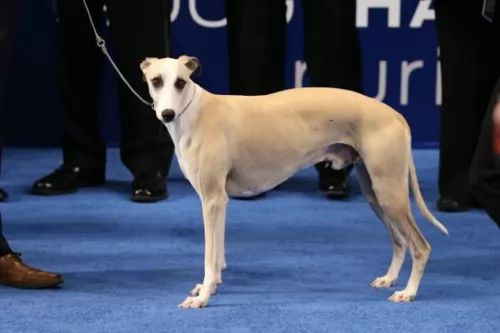 You can just see that Whippets are designed for speed with those super lean, slender bodies. They were developed by crossing Greyhounds with smaller terriers.
You can just see that Whippets are designed for speed with those super lean, slender bodies. They were developed by crossing Greyhounds with smaller terriers.
In open areas, they can pick up a high speed. In the 19th century in certain parts of England, they were used in races. They actually originated in England.
The Whippet is an ancient dog breed if you can go according to artwork which dates back to ancient Egyptian times.
They were also known as Snap dogs or small Greyhounds. You can say that the modern Whippet emerged in 1891. This was when the Kennel Club gave the breed official recognition. It was in 1888 that the dog was recognized by the American Kennel Club.
 The Queensland Heeler is a medium sized dog that stands between 43 and 51cm in height, both male and female. The dog weighs in the region of 15 to 22kg.
The Queensland Heeler is a medium sized dog that stands between 43 and 51cm in height, both male and female. The dog weighs in the region of 15 to 22kg.
He has a short double coat with colors being blue, mottled blue and also red speckled. You’ll also find black and tan coloring on this active dog.
He is strong, lean and muscular with medium sized ears that are erect. The eyes are dark and alert, the legs straight and strong. The tail can be docked or left long.
The Australian Cattle Dog is a high-energy working dog that you won’t easily find lying around. The alert eyes are consistently looking around for action and he can’t be bored otherwise he could resort to digging or other destructive behavior.
He is loving to his entire human family, but being particularly attached to just one family member. He is also protective, taking his guarding role of his family seriously.
He gets on well with children and other pets but you’ve just got to keep your eyes on him around children as when excited he can give a nip or two.
Training and socialization will be important for this dog, particularly because he can be strong-headed, willful and stubborn.
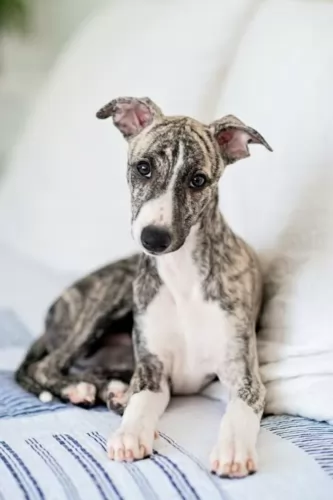 The Whippet is a medium-sized sighthound breed standing at between 45–56cm in height and weighing anything between 6 and 13kg.
The Whippet is a medium-sized sighthound breed standing at between 45–56cm in height and weighing anything between 6 and 13kg.
They descended from Greyhounds, resembling them in looks, just smaller. They are part of the Hound group, It’s a deep-chested dog with a long, lean head with fairy large eyes, a long neck, floppy ears and slim legs. The tail is long and slender. The coat is short and smooth and comes in many colors – tan, silver, black white, brindle and bi- or tri-colored.
The Whippet loves to run but when they’re not prancing around, they love spending time with their human family and that includes other pets as well as children.
They’re demonstrative and love showing their love for their family. They’re able to adapt to life in the city or the countryside but they will need exercising.
This is also a dog that rarely barks. They’re willful dogs so will do well with training and socialization. In fact, without proper socialization, they can become timid in unknown environments. They're intelligent so wont have problems with learning.
If you’re looking for a good watchdog and protector, you won’t find these characteristics in the Whippet.
 Active, intelligent, feisty, brave, playful, loving – these are just some of the wonderful characteristics you get when you bring a Queensland Heeler into your home.
Active, intelligent, feisty, brave, playful, loving – these are just some of the wonderful characteristics you get when you bring a Queensland Heeler into your home.
True, he is independent, self-willed and stubborn, but training and socialization can take away all the rough edges.
He forms a strong bond with his human owner, and once you’ve had one of these amazing dogs in your life, you’ll be convinced that dogs are truly man’s best friend.
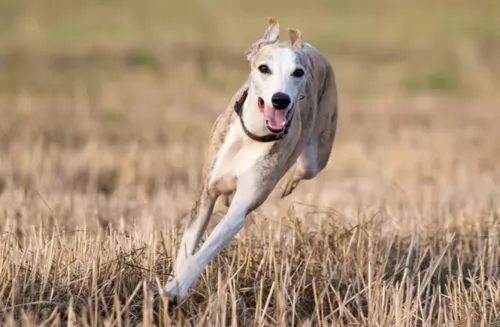 When you bring a sweet-natured Whippet into your life and home you’ll discover that apart from reveling in having a good run, their next favorite thing is to be resting quietly wherever their human companions are.
When you bring a sweet-natured Whippet into your life and home you’ll discover that apart from reveling in having a good run, their next favorite thing is to be resting quietly wherever their human companions are.
They’re docile dogs, loving to snuggle up to you, and not enjoying the cold. These quiet, gentle dogs are totally non- aggressive, just wanting to be with you, making you a splendid companion and pet.
 Australian Cattle Dogs are healthy. Every dog, even the most healthiest breeds, can succumb to some of the common dog illnesses there are.
Australian Cattle Dogs are healthy. Every dog, even the most healthiest breeds, can succumb to some of the common dog illnesses there are.
This is an inherited condition, so if you’re looking for a puppy, be careful about the breeder you buy from.
This is another inherited condition where the thighbone of the dog doesn't fit properly into the hip joint. Your dog is usually so active but with this problem he may well be in pain and actually be lame. Your pet can even develop arthritis . The idea is to get your pet to the vet because it can be unbearable to see him in pain and unable to get around.
This eye disease can mean deterioration of the retina. You'll recognize the signs when you see your dog unable to navigate around your home during the night. He is night blind but later on he can’t see during the day either.
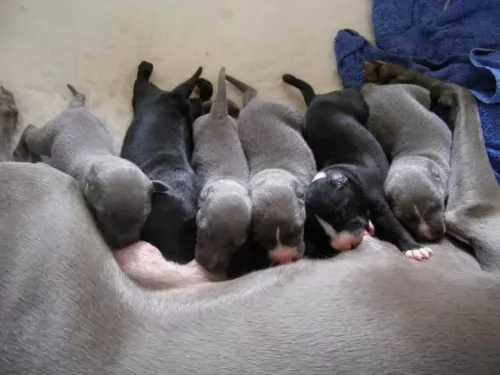 The lean Whippet doesn’t have any particular health problems but it is always a good idea to be clued up on some of the more common dog diseases there are.
The lean Whippet doesn’t have any particular health problems but it is always a good idea to be clued up on some of the more common dog diseases there are.
Buying a Whippet puppy from a responsible breeder will help with ensuring a healthier dog as dogs like these have had a good start and will have been vaccinated and dewormed.
This is when the heart of the dog beats too fast or too slow or it may even skip a beat. It is fairly common in dogs and it could indicate a more serious underlying condition.
An irregular heartbeat can bring about physical weakness and even loss of consciousness. Your veterinarian will want to examine your dog and listen to the history of symptoms and events that could have led to the condition. Your vet will then discuss treatment.
 To cope with his life on the Australian Outback, the Queensland Heeler is known to be a low maintenance dog.
To cope with his life on the Australian Outback, the Queensland Heeler is known to be a low maintenance dog.
The thick coat does shed and it can get dusty so a good brush twice a week is all that is basically required for this dog. If his nails don’t wear down naturally, you will need to have them trimmed. As with every dog, you will need to give attention to his ears and teeth.
This is an extremely active dog. He is going to be needing both mental and physical stimulation to avoid boredom, after all he is used to an active lifestyle herding cattle. Hikes, swimming, running – you name it – he’ll join you with all your activities.
Your Queensland Heeler is such a vibrant dog, full of the joys of living, and you want to ensure he has good food to eat to ensure he stays like that.
For convenience you get some excellent commercially manufactured dog foods. Your Blue Heeler is such a wonderful companion dog that you want to spoil him a bit and give him some delicious home-made food too. Boiled chicken, brown rice or pasta and spinach, sweet potatoes and carrots are a healthy choice for your pet – plain and simple just like dogs love it. Chop it up and add it into the high quality dry kibble a couple of times a week.
Some raw meat added in from time to time will help his skin and coat remain healthy. Never leave him without a constant source of fresh, cool water.
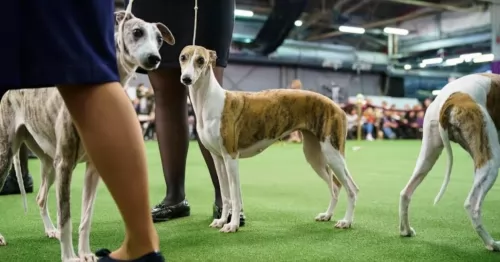 Whippets love running so if you’re lucky to live on a farm or at the beach, he will love those short bursts of speed in open places, chasing a ball. You can take him for a walk every day too.
Whippets love running so if you’re lucky to live on a farm or at the beach, he will love those short bursts of speed in open places, chasing a ball. You can take him for a walk every day too.
Whippets are looked upon as low maintenance dogs that don't shed much. A good brush twice a week will be adequate for this slender dog. The skin is vulnerable to cuts so check him over when you’re brushing him and make sure he hasn’t any sores or scrapes on the skin.
How much your adult dog eats depends on his size and his activity levels. Dogs are individuals and not all Whippets will eat the same amount of food. Puppies require 4 bowls of food a day while the adult Whippet will want 2 bowls of food.
There are excellent dry kibble dog foods on the market but your Whippet will also like some home-made food like chicken and vegetables. The quality of dog food you provide for your Whippet will make a huge difference to his health.